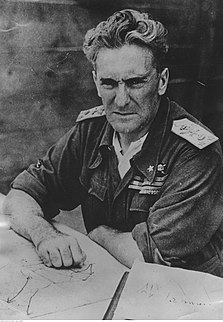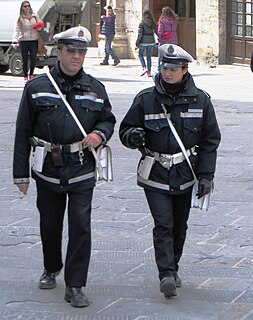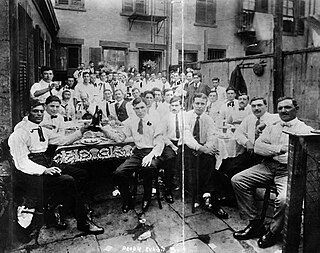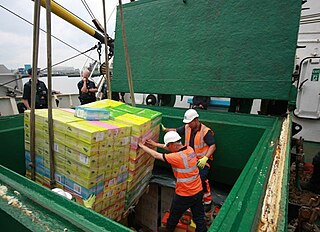
The 'Ndrangheta is a Mafia-type organized crime group based in Calabria, Italy. Despite not being as famous abroad as the Sicilian Mafia, and having been considered more rural than the Neapolitan Camorra and the Apulian Sacra Corona Unita, the 'Ndrangheta became the most powerful crime syndicate in Italy in the late 1990s and early 2000s. While commonly tied together with the Sicilian Mafia, the 'Ndrangheta operates independently from them, though there is contact between the two, due to the geographical proximity and shared culture and language between Calabria and Sicily.
The Camorra is an Italian Mafia-type crime syndicate, or secret society, which arose in the region of Campania and its capital Naples. It is one of the oldest and largest criminal organizations in Italy, dating back to the 17th century. Unlike the pyramidal structure of the Sicilian Mafia, the Camorra's organizational structure is more horizontal than vertical. Consequently, individual Camorra clans act independently of each other, and are more prone to feuding among themselves.

Marshal Rodolfo Graziani, 1st Marquis of Neghelli, was a prominent Italian military officer in the Kingdom of Italy's Regio Esercito, primarily noted for his campaigns in Africa before and during World War II. A dedicated fascist, he was a key figure in the Italian military during the reign of Victor Emmanuel III.
Omertà is a Southern Italian code of honor and code of silence that places importance on silence in the face of questioning by authorities or outsiders; non-cooperation with authorities, the government, or outsiders; and willfully ignoring and generally avoiding interference with the illegal activities of others. It originated and remains common in Southern Italy, where banditry or brigandage and Mafia-type criminal organizations are strong. Similar codes are also deeply rooted in other areas of the Mediterranean, including rural Spain, Crete (Greece), and Corsica, all of which share a common or similar historic culture with Southern Italy.
The National Crime Syndicate was the name given by the press to the multi-ethnic, loosely connected American confederation of several criminal organizations, a confederation that mostly consisted of the closely interconnected Italian-American Mafia and Jewish mob but also included to various lesser extents Irish-American criminal organizations and other ethnic crime groups. The name's origins are uncertain.
A crime boss, crime lord, don, kingpin, or mob boss is a person in charge of a criminal organization. A boss typically has absolute or nearly absolute control over their subordinates, is greatly feared by their subordinates for their ruthlessness and willingness to take lives to exert their influence, and profits from the criminal endeavors in which their organization engages.

The Five Families are the five major New York City organized crime families of the Italian American Mafia.

A caporegime or capodecina, usually shortened to just a capo, is a rank used in the Mafia for a made member of the crime family who heads a "crew" of soldiers and has major social status and influence in the organization. Caporegime is an Italian word, which is used to signify the head of a family in Sicily, but has now come to mean a ranking member, similar to captain or senior sergeant in a military unit. In general, the term indicates the head of a branch of an organized crime syndicate who commands a crew of soldiers and reports directly to the Don (Boss) or an Underboss or Streetboss.
In the American Mafia and Sicilian Mafia, a made man is a fully initiated member of the Mafia. To become "made," an associate first has to be sponsored by another made man. An inductee will be required to take the oath of Omertà, the mafia code of silence. After the induction ceremony, the associate becomes a "made man" and holds the rank of soldier in the Mafia hierarchy.

Organized crime in Italy and its criminal organizations have been prevalent in Italy, especially Southern Italy, for centuries and have affected the social and economic life of many Italian regions since at least the 19th century.
Poliziotteschi constitute a subgenre of crime and action films that emerged in Italy in the late 1960s and reached the height of their popularity in the 1970s. They are also known as Italo-crime, Euro-crime, poliziesco, spaghetti crime films, or simply Italian crime films. Influenced by both 1970s French crime films and gritty 1960s and 1970s American cop films and vigilante films, poliziotteschi films were made amidst an atmosphere of socio-political turmoil in Italy and increasing Italian crime rates. The films generally featured graphic and brutal violence, organized crime, car chases, vigilantism, heists, gunfights, and corruption up to the highest levels. The protagonists were generally tough working class loners, willing to act outside a corrupt or overly bureaucratic system.

Jewish-American organized crime emerged within the American Jewish community during the late 19th and early 20th centuries. It has been referred to variously in media and popular culture as the Jewish Mob, Jewish Mafia, Kosher Mafia, Kosher Nostra, or Undzer Shtik. The last two of these terms are direct references to the Italian Cosa Nostra; the former is a play on the word kosher, referring to Jewish dietary laws; while the latter is a direct translation of the Italian phrase Cosa Nostra into Yiddish, which was at the time the predominant language of the Jewish diaspora in the United States.
The Albanian mafia or Albanian organized crime are the general terms used for criminal organizations based in Albania or composed of ethnic Albanians. Albanian organized crime is active in Europe, North America, South America, and various other parts of the world including the Middle East and Asia. The Albanian Mafia participates in a diverse range of criminal enterprises including trafficking in drugs, arms, humans, and human organs. The Albanian criminal scenario is characterized by diversified criminal plans which, in their complexity, show one of the highest criminal capacities in the world. In Albania alone, there are over 15 mafia families that control organized crime. According to WikiLeaks reports, the Albanian mafia has monopolized various international affiliations from as far east as Israel, to as far west as South America. These reports primarily indicate a strong connection between politicians and various Albanian mafia families. According to the Research Institute for European and American Studies (RIEAS), Albanian mafia groups are hybrid organizations, often involved in both criminal and political activities.
The East Harlem Purple Gang was a semi-independent gang of Italian American hit-men and heroin dealers who, according to federal prosecutors, dominated heroin distribution in East Harlem, Italian Harlem, and the Bronx during the late 1970s and early 1980s in New York City. Though mostly independent of the Italian-American Mafia and not an official Mafia crew, the gang was originally affiliated with and worked with the Lucchese crime family and later with the Bonanno crime family and Genovese crime family. It developed its "closest ties" with the Genovese family, and its remnants or former members are now part of the Genovese family's 116th Street Crew.

Crime in Italy is combated by the spectrum of Italian law enforcement agencies.
The American Mafia or Italian-American Mafia is a highly organized Italian-American criminal society. The organization is often referred to by members as Cosa Nostra and by the government as La Cosa Nostra (LCN). The organization's name is derived from the original Mafia or Cosa nostra, the Sicilian Mafia, and it originally emerged as an offshoot of the Sicilian Mafia; however, the organization eventually encompassed or absorbed other Italian-American gangsters and Italian-American crime groups living in the United States and Canada that are not of Sicilian origin. It is often colloquially referred to as the Italian Mafia or Italian Mob, though these terms may also apply to the separate yet related Sicilian Mafia or other organized crime groups in Italy.
The Siderno Group is a criminal association in Canada and Australia related to the 'Ndrangheta, a Mafia-type organisation in Calabria. The association is labelled the "Siderno Group" because its members primarily came from the town of Siderno on the Ionian coast in Calabria and migrated to Canada and Australia in the 1950s.
The Commisso 'ndrina is a powerful clan of the 'Ndrangheta, a criminal and mafia-type organisation in Calabria, Italy. The 'ndrina is based in Siderno, but has an important branch of the Siderno Group in the Greater Toronto Area in Canada.

The Brooklyn Camorra or New York Camorra is a loose grouping of early-20th-century organized crime groups that formed among Italian immigrants originating in Naples and the surrounding Campania region living in Greater New York, particularly in Brooklyn. In the early 20th century, the criminal underworld of New York City consisted largely of Italian Harlem-based Sicilians and groups of Neapolitans from Brooklyn, sometimes referred to as the Brooklyn Camorra, as Neapolitan organized crime is referred to as the Camorra.










